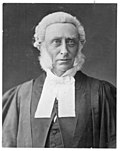A request that this article title be changed to 1863–1864 Whitaker–Fox ministry is under discussion . Please do not move this article until the discussion is closed. |
The Whitaker-Fox Ministry was a responsible government which held power in New Zealand from October 1863 to November 1864. Although Frederick Whitaker was the head of the government, he was never appointed premier as that office had yet to be established. Instead, he was attorney-general sitting in the Legislative Council while William Fox led the Government in the lower house. [1]




